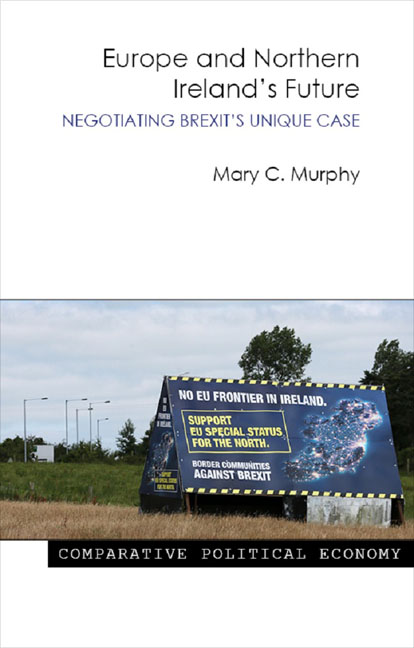Book contents
- Frontmatter
- Dedication
- Contents
- Acknowledgements
- Foreword
- Abbreviations
- 1 The political economy of a pressured relationship
- 2 The politicization of Brexit in Northern Ireland
- 3 When introverted politics and political economy collide
- 4 Who speaks for Northern Ireland?
- 5 Europe and Northern Ireland’s future
- References
- Index
1 - The political economy of a pressured relationship
Published online by Cambridge University Press: 16 August 2023
- Frontmatter
- Dedication
- Contents
- Acknowledgements
- Foreword
- Abbreviations
- 1 The political economy of a pressured relationship
- 2 The politicization of Brexit in Northern Ireland
- 3 When introverted politics and political economy collide
- 4 Who speaks for Northern Ireland?
- 5 Europe and Northern Ireland’s future
- References
- Index
Summary
After a prolonged period of conflict spanning four decades, political violence in Northern Ireland has dissipated. Agreement on the creation of power-sharing institutions was achieved in 1998 and has been followed by a lowering of tensions between the nationalist and unionist communities. Relations between Northern Ireland and the Republic of Ireland, and between the UK and Ireland have simultaneously been transformed. Economic growth and prosperity has materialized on both sides of the border. All of these positive developments have happened against the backdrop of joint Irish and UK membership of the European Union (EU).
The June 2016 referendum decision to exit the EU represents a critical moment for the UK, and for its constituent parts. The outcome and aftermath of the vote revealed the existence of marked political, ideological, socio-economic, demographic and geographic divisions across the UK. The Northern Ireland electorate voted for the UK to remain in the EU. Of those who voted in Northern Ireland, 55.8 per cent supported the UK’s continued membership. This result is at odds with the overall UK referendum result, which narrowly supported the Leave position. Like Scotland, London and Gibraltar, the Northern Ireland preference for Remain was subsumed by the UK-wide preference for Leave. The suspension of Northern Ireland’s devolved institutions in early 2017 followed in May by elections to the Northern Ireland Assembly and then shortly after that a UK general election added an intriguingly unexpected dimension to the question of how to deal with Northern Ireland interests during and after UK withdrawal. A loose political pact between the Conservative Party and Northern Ireland’s Eurosceptic Democratic Unionist Party (DUP) prompted very real concerns about the impact of such a move on the shape of the UK’s Brexit deal and on what the new UK government arithmetic might mean for political stability in Northern Ireland.
Given Northern Ireland’s geographic situation, its close economic and institutional ties with the Republic of Ireland, its political history of conflict, and the existence of a communal divide on the question of EU membership, the implications of the overall Leave vote were more profound for Northern Ireland than for any other part of the UK.
- Type
- Chapter
- Information
- Europe and Northern Ireland's FutureNegotiating Brexit's Unique Case, pp. 1 - 18Publisher: Agenda PublishingPrint publication year: 2018



